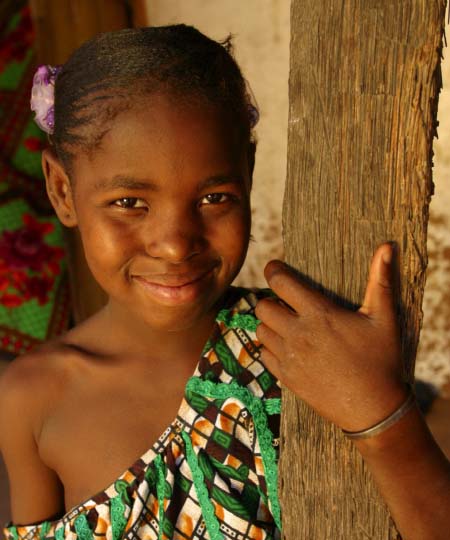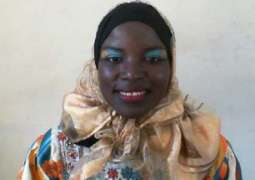
Child
Marriage also known as Early Marriage is a formal or informal union entered
into by an individual before reaching the age of 18, the legally prescribed.
The
Gambia became the 13th nation in Africa to join the African Union’s (AU)
campaign to end child marriage, which aims to raise awareness of the risks of
the practice.
Taking
a tough stance, President Yahya Jammeh announced a ban on child marriage in The
Gambia.
He
warned that heavy jail terms would be handed down to those found breaking the
law.
“As
from today, July 6, Child Marriage is illegal and is banned in The Gambia,”
Jammeh told a group of Muslim elders in the capital city Banjul.
“Anyone
who marries a girl under 18 years will spend 20 years in jail, the girl’s
parents would spend 21 years in jail and anyone who knows about it and fails to
report the matter to the authorities would spend 10 years in jail under the new
law (which is yet to be enacted).”
So
this reporter went out and about to sound the views of people on the recent ban
on child marriage, which has been a practice for centuries in The Gambia, as
well as other Africa countries.
Aja
Mam Sunkuding, 70, said at the time she heard about the ban she had mixed
feelings, because when she thinks about the issue she becomes sad, as well as
happy.
“I am sad, because of what will become the
time of our girls when this law is fully implemented. Girls will do whatever
they feel like doing as far as they are under 18, and there is going to be lots
of teenage pregnancies and unwanted babies.”
The
70-year-old lady added: “Girls will start to have boyfriends like nobody’s
business and do whatever married couples are supposed to do, and others will
even engage in early sex which will lead to prostitution, and you cannot be
married off because you are under 18.
“What
a country we are going to live in, any day this law is fully implemented!
Parents will no longer talk to their daughters about marrying even if you found
out that she is playing around,” the old lady lamented.
“Yet, I am also happy in another way, when I
think twice; because it will help teen girls to finish their education, and
prepare themselves for the future. I remembered when I was young, I was married
off at the age of 13 just because I was a girl,” she said.
Aja
Mam further said: “I was never given that privilege to go to school. I was seen
in the society as somebody who is a burden to the family, and I should go and
make my own family. And to add insult into injury, I was married off to a man I
never saw before talk less of giving my consent. So I just had to bear the
consequences and dance to the music, because I didn’t know where to run to or
report the matter to. I am so happy that there is not going to be that
situation now.”
She
said this new law would give girls the chance to make their own choice, prepare
themselves physically, mentally and even financially before they are finally
married off.
Isatou
Jallow, another woman, said by Islamic standards this law should not be
implemented because it would only bring disaster and disgrace to families, as
teenage pregnancies would be the order of the day whereas prostitution would
become their staple food.
“I
myself I don’t think child marriage should be banned because not all girls like
to go to school, and even if they go they will never sit in class. So you
expect that girl to sit in the compound or roaming the streets until when she
is 18 years to marry.”
She
added that before you realise she is 18 years old, she would have aborted 10
babies or born them out of wedlock, which is the greatest sin a human being
could commit on earth. And in the year after, parents are going to be
questioned as well punished for such sins committed by their daughters while
they watched.
Ms
Jallow added: “We see other girls who are 14-15 even 16 years getting pregnant
and having babies. Why can’t they be married off, because they are physically
and mentally ready to manage their own families.”
She
said instead of banning child marriage, we should fight together to end teenage
pregnancies out of wedlock.
Fatoumata
Minteh, who is a victim of child marriage, said she really welcomes the news,
because it would help a lot of girls to finish their schooling and engage
themselves in something lucrative, rather than being married-off at a tender
age, just like her.
“I
was the first born in a family of five, and I was the only girl of the family;
and even though I was in school, my parents decided to drop me out of school,
at the age of 15 years, and married me off.”
She
said when she heard the news, she was shocked more than horrified, asking “why
on earth should my parents do that to me?”
This
was because she loved school and she was trying to convince them not to, but
they turned a deaf ear to her, and she was finally taken to the husband to
marry, without her consent.
“I
have been yearning for a very long time for this to happen, and now that it has
happened I’m very much happy that girls will now have the chance to be
well-educated and make the best choice in their life.”
Women’s
rights campaigners have generally welcomed the ban, however, with some saying
that it would be better to engage with local communities to try to change
attitudes towards child marriage, instead of threatening families with prison
sentences.
Isatou
Jeng, an activist, said that the government should engage with local
communities to try to change attitudes towards child marriage, instead of
threatening families with prison.
“I don’t think locking parents up is the
answer. It could lead to a major backlash and sabotage of the ban.
“This
has been the practice for centuries, and the only thing that should be done now
is dialogue. In that way, it will change the perception of people on child
marriage,” she added.




